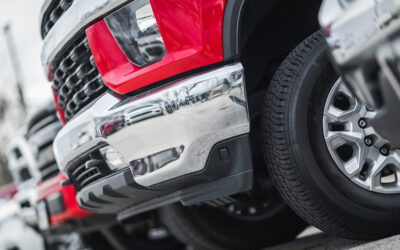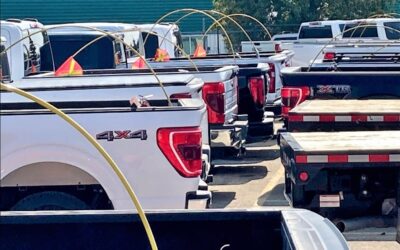Solve Vehicle Abuse and Stop Fleet Damage
One of the biggest problems in the fleet industry is that many drivers look at their company vehicles as something they are entitled to use. Relatively few drivers treat their vehicles as a tool that helps them perform the job that they are hired for. This sense of entitlement has caused fleet drivers to become complacent in taking care of fleet vehicles. This complacency and entitlement can result in damages to the vehicles. There is a dire need to eliminate this problem of fleet damage.
Fleet damage is not only because of the younger generation of fleet drivers. Yes, those driving fleet vehicles between the ages of 20 to 30 are known as the generation that feels more entitled to the vehicles they operate. That being said, there are many senior fleet drivers who have a different sense of entitlement. Since they have been driving company vehicles for long, they feel like they have earned the right to own these vehicles. In some cases, senior fleet managers may also be part of the problem as they grant senior drivers the leeway to do whatever they want to the company vehicles they drive. This can result in extensive fleet damage over the course of time.
To be fair, the majority of fleet drivers are careful with the vehicles they drive. In this blog, we’re talking about the minority of drivers who do not care much about their company’s assets. Neglecting or abusing company vehicles can result in substantial financial losses, which then the company owners need to cover.
What Happens As a Result of Company Vehicle Abuse
In most instances where vehicle drivers feel entitled to the vehicles they operate, they do not consider fleet trucks their responsibility. When they neglect the care of the company asset they are using, the company suffers. When it comes to reselling trucks, the value of a truck is based on several factors. These factors include overall usage, the age of the vehicle, the mileage and last but not least, the condition of the vehicle. If a company’s asset is stricken with fleet damage due to the neglect of the fleet driver, it can result in low resale value thus diminishing this company asset. Any refurbishing costs and reconditioning costs will end up increasing the fleet costs for the company.
Then there are drivers that smoke. All companies with fleets have no-smoking policies. Unfortunately, chain smokers do not really care about such policies, even while driving the company vehicle. Smoking in and of itself is potentially harmful for drivers but it can also cause significant fleet damage. The smell of tobacco and any damage done due to the random cigarette falling on the seat or floor can drastically reduce the resale value of a fleet vehicle. Fleet managers hate cigarette burns in vehicles.
Of course, since an abusive driver has no regard for the vehicle, you can also expect to see soda cans that have content spilled on the seats or on the floor, making the interior look more like a dumpster than a truck.
Vocational Fleets and Vehicle Abuse
Fleet damage is more recognizable when the condition of the vehicle is almost as good as new. When it comes to vocational fleet, drivers are likely to be more abusive towards the company assets. Since it is already in such a bad condition, a driver can treat the old unit badly and may possibly deny being responsible for the damages.
This is where fleet management comes in. If the company asset and all the equipment in it is properly maintained, any fleet damage will become easily identifiable for fleet managers. Since the driver will no longer have plausible deniability due to an already tattered vehicle, it will encourage them to be a little more careful with the vehicle.
Another very common form of fleet damage is done by overloading the fleet asset. When it comes to unscheduled fixes, overloaded trucks are the main reason this happens in a fleet. Improper training is also a reason for fleet damage. Operators do not know how to use the equipment properly and it can cause significant damages to occur.
Enforcement of Fleet Policies
The biggest culprit behind fleet damage? The lack of enforcement of fleet policies. As per the policies already defined by fleet operating companies, drivers are made aware of these best practices. Clear guidelines are defined for fleet drivers on how to properly use the company tool they have been provided for their job. They are provided with all the steps that they have to follow in order to make sure they operate their vehicles optimally. Fleet policies also define what the drivers are not supposed to do in order to minimize damages.
Informing drivers of these policies and enforcing them are two different things. Drivers need to be aware of the fact that there are consequences for not following fleet policies. Subsequently, fleet managers need to enforce strict consequences in the event that drivers fail to take care of the company asset. Of course, this is a delicate matter. Fleet managers do not want to disgruntle drivers, but they also need to ensure they are looking out for the company’s best interests.
Proper training sessions every few months and refresher sessions need to be conducted. Penalties are the most obvious and arguably the most effective way to ensure fleet policies are being followed. There should be a balance. Drivers that take care of their fleet assets also need to be incentivized for not contributing to fleet damage. Enforcing fleet policies that have already been defined can make a world of a difference to minimizing fleet damages. It is a balancing act that fleet costs are managed well and drivers are content with their work.
Source:
https://www.automotive-fleet.com/321159/vehicle-entitlement-mentality-leads-to-vehicle-abuse






